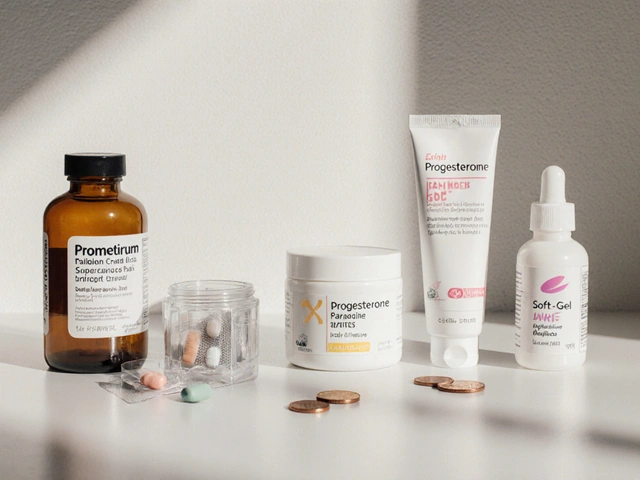Ask around, and you’ll find that the world of hormones is more confusing than your grandma’s secret pie recipe. Prometrium, that soft little capsule, has been turning up in medicine cabinets and sparking questions wherever hormone therapy is mentioned. You hear it whispered in waiting rooms, “Is it safe? Will it really help?” We’re surrounded by hormone advice, some good, some bad, but most people never get the real story on what Prometrium actually does for the body—especially for women tackling menopause or those facing certain fertility challenges. The discussion’s way bigger (and more interesting) than you’d think.
What is Prometrium Seriously Used For?
Prometrium is a brand name for micronized progesterone, which is a bioidentical hormone that mimics the progesterone our bodies naturally make. It isn’t just another synthetic mix; it’s made from plant sources but formulated to be pretty much identical, molecule-for-molecule, to what your ovaries churn out. Doctors turn to Prometrium most often in two big situations: helping women on estrogen replacement therapy avoid issues linked to unopposed estrogen (like endometrial cancer), and supporting women with fertility struggles by supplementing low natural progesterone.
What makes Prometrium a hot topic in menopause lounges and OB-GYN chats is the growing trend toward bioidentical hormone therapy. Many women are wary of synthetic progestins due to risks spelled out in big studies—think Women’s Health Initiative, 2002—but want the benefits of estrogen. So, Prometrium comes in as the partner to balance things out. Gynecologists in Canada and the US increasingly prescribe it not only because it reduces those big cancer risks, but because patients report fewer side effects like bloating, mood swings, and grogginess compared to synthetic versions.
But don’t get the idea it’s for everyone or every situation. When it comes to fertility, Prometrium is used to support the second half of the menstrual cycle, especially in some IVF protocols or for women whose own bodies don’t pump out enough progesterone at the right times. It’s not a magic bullet for every cycle problem, though. And yes, it can show up for other rare uses—like treating absence of periods (amenorrhea) or certain PMS struggles—but those are more side notes than main headlines.
Here’s an interesting fact: Canada was one of the first countries to approve bioidentical oral progesterone under the Prometrium label, making it easier for doctors and patients to move away from older synthetic progestins. So, in a way, if you’re in Calgary (like me), you’re close to the front of the pack.
How Does Prometrium Work in the Body?
The science behind Prometrium isn’t rocket science, but it’s pretty cool. Basically, progesterone helps balance out estrogen effects—especially on the lining of the uterus. Estrogen alone thickens that lining, which, if left unchecked, could grow out of control and potentially become cancerous. Progesterone reins this in, thinning the lining and keeping it in check.
One of the neat things about Prometrium—because it’s bioidentical—is that your body treats it like the real deal. It interacts with progesterone receptors in all sorts of tissues: your uterus, brain, bones, even your breasts. That means the stuff isn’t just doing one job. For example, some women notice fewer night sweats and sleep better when they take it, which is linked to how progesterone influences temperature regulation and sleep cycles in the brain.
It’s usually swallowed as a soft gel capsule, but here’s a trick some fertility clinics use: they’ll tell women to use it vaginally. Sounds weird, but the reason is simple—direct delivery to the uterus bypasses the liver (where a lot of hormone gets broken down and lost). This clever method can minimize side effects like dizziness or headaches.
Some studies point out that micronized progesterone (what’s in Prometrium) may be a better pick than synthetic forms for heart health and blood clots, too. In a 2020 review in "Menopause" journal, researchers found that natural progesterone didn’t spike clot risks as much as older progestins—good news for anyone worried about deep vein thrombosis after menopause.

Benefits and Side Effects: The Real Deal
Let’s get honest about the ups and downs. On the positive side, Prometrium does its main job well: balancing out the effects of estrogen so you don’t get irregular bleeding or raise your risk of endometrial cancer. That’s huge, especially for menopausal women who want to take estrogen but are worried about those long-term dangers.
A lot of patients and doctors report that Prometrium is gentler on moods, sleep, and weight than earlier progestins. Women often say they feel more like themselves—less irritable, less puffy, fewer emotional rollercoasters. And who doesn’t want that? Insomnia and anxiety can ease up a bit for some folks, which is a breath of fresh air when hormones are wreaking havoc.
But it’s not all sunshine. Some women get dizzy, a little tipsy feeling, right after taking the capsule—which is why many doctors recommend taking it at bedtime. Digestive complaints like nausea or bloating crop up, though usually not as much as with non-natural progestins. And if you’re sensitive, you might still get breast tenderness or headaches. Even though Prometrium is often easier than synthetics, any hormone can mess with your system in unexpected ways.
Here’s the kicker about allergies—Prometrium capsules are made with peanut oil. That’s a hard stop for anyone with peanut allergies. Luckily, there are peanut-free formulations in other countries, but in Canada and the US, the commercial product still uses peanut oil as a base. Always double-check with your pharmacist about ingredients.
Here’s a perspective from The North American Menopause Society:
“Micronized progesterone appears to be associated with a better side effect profile and less risk for adverse events than many earlier synthetic progestins.”
Tips for Taking Prometrium: Life Hacks from the Trenches
Getting the most out of Prometrium isn’t just about swallowing a pill. Timing, routine, and knowing what to expect matter. If you get sleepy after taking it (which is common), use that to your advantage: take it about 30-60 minutes before you’re aiming to be asleep. If you work shifts or have unpredictable nights, ask your doctor if splitting one capsule into two smaller doses makes sense for your body. Pregnancy planning? Timing really is everything. For fertility support, your clinic might recommend vaginal use—sometimes richer absorption, fewer side effects.
Be clear with your doctor about any medications you’re using, especially strong antifungals or seizure drugs, because these can make your body clear Prometrium either faster or slower than normal. It’s worth mentioning anything herbal, too. Even St. John’s Wort—a harmless-looking tea shelf favorite—can interfere with how your liver breaks down hormones.
Here’s something patients rarely get told: Store Prometrium at room temperature and keep it dry. Too much heat or light can degrade the hormone—so don’t leave it in your car glovebox on those hot Calgary summer days. And since it’s in a gel capsule, don’t try to cut it in half unless your doctor says it’s okay. There’s no easy way to evenly split that dose.
If you’re starting Prometrium for the first time, keep a “symptom diary” for the first two cycles. Jot down any mood changes, headaches, or sleep patterns. Then, if you’re troubleshooting with your doctor, you’ll have ammo: real-life data, not foggy memory. If your periods are irregular, tracking them helps the doctor adjust your protocol, especially if you’re combining Prometrium with estrogen patches or creams.

Frequently Asked Questions and Worries
Is Prometrium vegan? No, and not just because of the hormone—it’s the gelatin in the capsules. If somebody needs a plant-based alternative, they’ll need to look outside brand-name Prometrium and talk about compounding pharmacies. How long can you safely stay on Prometrium? For most women on menopause hormone therapy, doctors re-evaluate every year, but many use it for several years without trouble as long as cancer screenings and regular blood work are up to date.
Will Prometrium cause weight gain? A lot of people worry about this, maybe from old stories about "the pill." Realistically, studies show it’s not likely to cause significant weight gain in the general population, especially compared to older progestins. Some women actually feel less bloated thanks to its more natural effects on salt and water retention.
“Do I need to avoid certain foods?” Not really, unless you’re allergic to peanuts. But because Prometrium is processed in the liver, going easy on booze is smart, not only for hormone balance but your liver’s sake. Also, some women get dizzy or groggy right after taking it, so avoid driving or heavy machinery if you feel off—until you know how your body handles the dose.
“Is it safe if I have a family history of blood clots?” Good question, and this is where talking to your doctor is critical. There’s evidence that bioidentical progesterone like Prometrium poses less risk for clotting than synthetic progestins, but it’s never a “free pass.” Always review your whole health picture with your doctor before starting.
And don’t forget: every so often, it’s worth checking if new formulations or generic versions have hit the market, especially if you’re struggling with side effects or cost. Drug development is faster now than ever, and what wasn’t available last year may be next time you visit the pharmacy.











